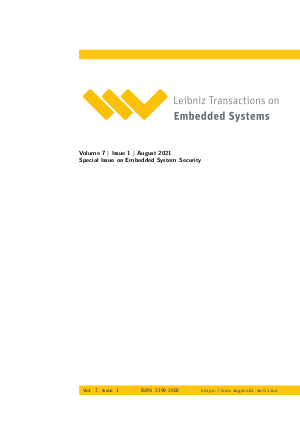Leibniz Transactions on Embedded Systems, Volume 7, Issue 1
LITES, Volume 7, Issue 1
-
Part of:
Volume:
LITES, Volume 7
Journal: Leibniz Transactions on Embedded Systems (LITES)

Special Issue
Special Issue on Embedded System SecurityEditors
Publication Details
- published at: 2021-08-12
- Publisher: Schloss Dagstuhl – Leibniz-Zentrum für Informatik
- DBLP: db/journals/lites/lites7
Access Numbers
- Detailed Access Statistics available here
-
Total Accesses (updated on a weekly basis)
0Documents
Documents
LITES, Volume 7, Issue 1
Abstract
Cite as
LITES, Volume 7, Issue 1: Special Issue on Embedded System Security, pp. 1-64, Schloss Dagstuhl – Leibniz-Zentrum für Informatik (2021)
Copy BibTex To Clipboard
@Article{LITES-v007-i001,
title = {{LITES, Volume 7, Issue 1}},
journal = {Leibniz Transactions on Embedded Systems},
pages = {1--64},
ISSN = {2199-2002},
year = {2021},
volume = {7},
number = {1},
publisher = {Schloss Dagstuhl -- Leibniz-Zentrum f{\"u}r Informatik},
address = {Dagstuhl, Germany},
URL = {https://drops.dagstuhl.de/entities/document/10.4230/LITES-v007-i001},
doi = {10.4230/LITES-v007-i001},
annote = {Keywords: LITES, Volume 7, Issue 1}
}
Foreword
Abstract
Cite as
LITES, Volume 7, Issue 1: Special Issue on Embedded System Security, p. 0:i, Schloss Dagstuhl – Leibniz-Zentrum für Informatik (2021)
Copy BibTex To Clipboard
@Article{burns_et_al:LITES.7.1.0,
author = {Burns, Alan and Goddard, Steve},
title = {{Foreword}},
journal = {Leibniz Transactions on Embedded Systems},
pages = {00:1--00:1},
ISSN = {2199-2002},
year = {2021},
volume = {7},
number = {1},
publisher = {Schloss Dagstuhl -- Leibniz-Zentrum f{\"u}r Informatik},
address = {Dagstuhl, Germany},
URL = {https://drops.dagstuhl.de/entities/document/10.4230/LITES.7.1.0},
URN = {urn:nbn:de:0030-drops-192837},
doi = {10.4230/LITES.7.1.0},
annote = {Keywords: Foreword, Embedded System Security}
}
Randomization as Mitigation of Directed Timing Inference Based Attacks on Time-Triggered Real-Time Systems with Task Replication
Abstract
Cite as
Kristin Krüger, Nils Vreman, Richard Pates, Martina Maggio, Marcus Völp, and Gerhard Fohler. Randomization as Mitigation of Directed Timing Inference Based Attacks on Time-Triggered Real-Time Systems with Task Replication. In LITES, Volume 7, Issue 1 (2021): Special Issue on Embedded System Security. Leibniz Transactions on Embedded Systems, Volume 7, Issue 1, pp. 01:1-01:29, Schloss Dagstuhl – Leibniz-Zentrum für Informatik (2021)
Copy BibTex To Clipboard
@Article{kruger_et_al:LITES.7.1.1,
author = {Kr\"{u}ger, Kristin and Vreman, Nils and Pates, Richard and Maggio, Martina and V\"{o}lp, Marcus and Fohler, Gerhard},
title = {{Randomization as Mitigation of Directed Timing Inference Based Attacks on Time-Triggered Real-Time Systems with Task Replication}},
journal = {Leibniz Transactions on Embedded Systems},
pages = {01:1--01:29},
ISSN = {2199-2002},
year = {2021},
volume = {7},
number = {1},
publisher = {Schloss Dagstuhl -- Leibniz-Zentrum f{\"u}r Informatik},
address = {Dagstuhl, Germany},
URL = {https://drops.dagstuhl.de/entities/document/10.4230/LITES.7.1.1},
URN = {urn:nbn:de:0030-drops-192847},
doi = {10.4230/LITES.7.1.1},
annote = {Keywords: real-time systems, time-triggered systems, security}
}
We know what you're doing! Application detection using thermal data
Abstract
Cite as
Philipp Miedl, Rehan Ahmed, and Lothar Thiele. We know what you're doing! Application detection using thermal data. In LITES, Volume 7, Issue 1 (2021): Special Issue on Embedded System Security. Leibniz Transactions on Embedded Systems, Volume 7, Issue 1, pp. 02:1-02:28, Schloss Dagstuhl – Leibniz-Zentrum für Informatik (2021)
Copy BibTex To Clipboard
@Article{miedl_et_al:LITES.7.1.2,
author = {Miedl, Philipp and Ahmed, Rehan and Thiele, Lothar},
title = {{We know what you're doing! Application detection using thermal data}},
journal = {Leibniz Transactions on Embedded Systems},
pages = {02:1--02:28},
ISSN = {2199-2002},
year = {2021},
volume = {7},
number = {1},
publisher = {Schloss Dagstuhl -- Leibniz-Zentrum f{\"u}r Informatik},
address = {Dagstuhl, Germany},
URL = {https://drops.dagstuhl.de/entities/document/10.4230/LITES.7.1.2},
URN = {urn:nbn:de:0030-drops-192850},
doi = {10.4230/LITES.7.1.2},
annote = {Keywords: Thermal Monitoring, Side Channel, Data Leak, Sequence Labelling}
}
